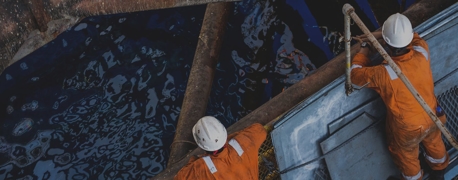Are Rig Workers Covered Under the Jones Act?

The Jones Act, formally known as the Merchant Marine Act of 1920, provides that maritime workers on sea vessels can seek compensation for injuries acquired while at sea. This law clearly covers commercial fishermen, sailors, and cruise ship workers, but what about oil rig workers?
When the Jones Act was first enacted over 100 years ago, it specifically addressed maritime vessels. At that time, offshore oil and gas operations were relatively new, and the designs of platforms and rigs were continuously evolving. The construction of the first offshore rig in the Gulf of Mexico in 1938 marked a significant development, and the offshore industry grew exponentially in the following decades. However, for many years, the application of the Jones Act to offshore rigs remained ambiguous.
It wasn't until 2005, when the Supreme Court made a landmark decision in the case of Stewart v. Dutra Construction, that this ambiguity was finally addressed. In its ruling, the court defined a vessel as "every description of watercraft or other artificial contrivance used, or capable of being used, as a means of transportation on water." This broadened interpretation meant that many structures, like oil rigs, could now be classified as vessels.
It also meant that oil rig workers could be classified as seamen and entitled to benefits under the Jones Act. Let's take a closer look.
About the Jones Act: Why Was It Created?
Maritime commerce and the rights of seamen have always been crucial subjects in U.S. law, tracing back to the earliest days of the nation. Seafarers faced dangerous conditions, and historically there were efforts to ensure their protection. The concept of a sailor having a right to seek compensation for injuries can be found in legislation and legal precedent well before the 20th century.
The First World War highlighted the U.S.’s dependence on foreign shipping. The country was caught off-guard by the lack of domestic vessels available to serve in the war, prompting a reevaluation of its maritime policies. The Merchant Marine Act of 1920 was enacted partly in response to this vulnerability.
The Jones Act was designed to accomplish several things:
- Promote a robust U.S. Merchant Marine: The Act sought to ensure that the country would have a fleet of commercial and military ships available in times of need.
- Protect U.S. commercial interests: It restricted domestic shipping (transportation of goods between U.S. ports) to American-built, -owned, -crewed, and -flagged vessels. This ensured that U.S. commerce would be carried out predominantly by U.S. ships, bolstering domestic shipbuilding and maritime employment.
- Protect maritime workers: This is the most well-known aspect of the Jones Act. It allows seamen who are injured on the job to sue their employers for personal injury damages, a right not granted to most other workers. The Act recognized the unique dangers of maritime work and aimed to provide a robust legal remedy for injured sailors. This protection extends to most offshore oil and gas workers.
The Jones Act & Oil Rig Workers
Coverage of oil rig workers under the Jones Act largely depends on the kind of rig that they work on. If the job site is a jack-up rig or another mobile type of vessel, the Jones Act will often cover offshore injuries, as the rig could be considered a sea-going vessel. To be considered a "seaman" under the Jones Act, a worker must spend more than 30 percent of his or her time in the service of a vessel on navigable waters. Almost every rig worker falls under this category, as they often work long hours, and any work on the rig, whether drilling or maintaining it, would be considered in the service of a vessel.
When an offshore oil rig worker qualifies as a seaman under the Jones Act, they may seek compensation for any injuries resulting from the negligence of their employers. They may be entitled to financial compensation for medical care, lost earnings, loss of future earnings, ongoing medical costs, and pain and suffering.
The following are examples of situations where an offshore rig worker may have a Jones Act case:
- Slip and Fall: If an employer fails to maintain a clean, safe deck, and a worker slips on oil, water, or other substance, resulting in injury.
- Faulty or Inadequate Equipment: Injuries caused by malfunctioning or poorly maintained equipment, tools, or machinery.
- Failure to Train: If a worker is injured because they were not properly trained to handle a particular piece of equipment or procedure.
- Inadequate Crew: If an employer does not have enough crew members to safely operate a vessel or rig, and a worker is injured as a result.
- Assaults: Physical attacks or altercations between crew members can result in injuries for which the employer may be held responsible, especially if they knew or should have known about the dangerous propensity of an employee.
- Exposure to Harmful Substances: Illness or injury resulting from exposure to toxic chemicals or hazardous conditions without proper protective equipment.
- Heavy Lifting: Back or other musculoskeletal injuries from lifting heavy objects without proper equipment or assistance.
- Unsafe Vessel Conditions: Injuries caused by structural defects or unsafe conditions of the vessel itself, constituting "unseaworthiness."
- Man Overboard Incidents: If an offshore worker goes overboard as a result of hazardous conditions on a rig or is not rescued in time because of improper or inadequate man overboard procedures and training.
- Explosions and Fires: Injuries resulting from an explosion or fire on a vessel or offshore rig, especially if caused by failure to maintain equipment or enforce safety protocols.
The validity of a Jones Act case will depend on the nature of the incident, its cause, the type of platform or rig, and whether the offshore worker is considered a seaman.
What About Workers on Fixed Platforms?
Offshore workers on fixed platforms in the U.S. are affected by a combination of the Jones Act and the Outer Continental Shelf Lands Act (OCSLA). Each piece of legislation has its scope and provisions, which might apply differently based on specific circumstances.
Here's an overview of how both might affect offshore workers on fixed platforms:
Jones Act:
- Definition of Seaman: The Jones Act protects seamen, which means workers who are more or less permanently connected to a vessel and contribute to its function or mission. Fixed platforms, being stationary and attached to the ocean floor, are generally not considered vessels. Therefore, workers on fixed platforms may not qualify as seamen under the Jones Act.
- Transitory Situations: However, there are exceptions. If an offshore worker is injured while being transported to or from a fixed platform on a vessel, or while working on a vessel near a fixed platform, the Jones Act might apply, assuming the worker can establish seaman status.
OCSLA:
- Jurisdictional Extension: The OCSLA extends U.S. federal law, including certain aspects of state law, to the Outer Continental Shelf (OCS). This encompasses fixed platforms used for mineral exploration, development, and production on the OCS. That includes oil and gas operations.
- Workers' Compensation: The OCSLA provides that if a worker is injured or dies on a fixed platform on the OCS, they or their beneficiaries are typically entitled to benefits under the Longshore and Harbor Workers' Compensation Act (LHWCA). This compensates for medical care, rehabilitation, and lost wages.
- Applicability of State Law: Under OCSLA, the laws of the adjacent state (the state closest to the fixed platform) can be applied as surrogate federal law on the OCS, provided they are "applicable and not inconsistent" with existing federal laws. This is significant for workers because it can grant them rights and protections derived from state laws.
Oil Rig Workers Deserve Legal Protection & Recourse
While the Jones Act offers a safety net for many maritime workers, its implications differ based on the nature of the vessel and the role of the worker. For those in this sector, understanding their rights is crucial to ensuring they receive the protection and compensation they deserve.
- Categories


